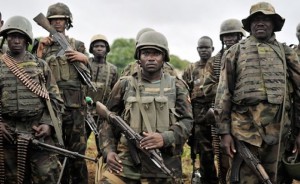The African Union will send a mission to northern Mali in the next few weeks to look into setting up a counter-terrorism force to support vulnerable U.N. peacekeepers, sources familiar with the matter said.
The Bamako government, as well as some officials of the U.N. force in Mali, MINUSMA, have called for more help in fighting al Qaeda-linked insurgents, who have become increasingly active despite the efforts of French, Malian and U.N. troops.
French forces drove the jihadists out of northern Malian cities in 2013 but they have regrouped, and in November al Qaeda in the Islamic Maghreb attacked a luxury hotel in Bamako, killing 20 people in a demonstration of their ability to strike beyond their desert bases.
Critics say the 10,000-strong U.N. force’s ability to bring peace to Mali is hamstrung by its lack of an aggressive counter-terrorism mandate, meaning it cannot hunt down militants and is vulnerable to attack.
At least 20 Malian and U.N. troops from Africa have been killed this year, according to Reuters estimates.
While an expansion of the U.N. mandate was discussed during a Security Council visit to Mali last week, some permanent members such as France say it is already sufficiently robust, although they back additional resources for the force.
The AU initiative is being floated as an alternative route to improved security, the sources say.
“There is an (AU) mission to assess the security threats in northern Mali in the next few weeks,” said one security source familiar with the visit who is not authorised to speak publicly.
“This will allow the development of a plan for an international force in the fight against terrorism,” he added, saying the AU planned to seek U.N. and Malian backing.
A Western diplomat said the force’s remit would be similar to an existing AU regional task force set up last year to fight jihadist group Boko Haram in the Lake Chad Basin.
Planning is at an early stage and details of troop numbers and financing have not yet been determined, the sources said.
AU officials at the continental body’s headquarters in Addis Ababa could not be reached for comment. A spokesman for the Malian defence ministry declined to comment.
Army spokesman Colonel Souleymane Maiga said: “I know that there have been recent meetings on a possible rapid intervention force but the form this force will take has not yet been decided as far as I know.”
FRANCE OVERSTRETCHED?
Besides funding, one of the difficulties might be harmonising security initiatives in a region where neighbours have a history of vying for influence, the sources added.
The Group of Five Sahel (G5 Sahel) – Chad, Niger, Burkina Faso, Mali and Mauritania – have also agreed to create EU-backed regional rapid reaction forces to counter Islamist militants.
G5 Sahel permanent secretary Najim Elhadj Mohamed said he had not been informed of the AU initiative and it was not clear if the two bodies would cooperate.
Mali’s northern neighbour Algeria set up a joint military operations centre for Sahel countries in 2010 but there have been few signs of progress on the ground.
Some security experts say more support is needed to fight jihadists in Mali since France’s 3,500-strong Barkhane force is overstretched. The Chad-based force was set up to combat Islamists across West Africa’s vast Sahel region.
“A bigger contribution from African forces could take the pressure off the French, who could focus more on securing borders and on ISIS (Islamic State) in Libya,” said Rida Lyammouri, an independent consultant focused on the Sahel and north Africa.
“But to succeed (the AU force) would have to match the violent extremist organisations in terms of their outreach to local communities in Mali,” he added.
reuters.com



